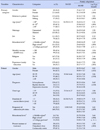1. Ministry of Health and Welfare. National mental health statistics pilot study 2017. Seoul: Ministry of Health and Welfare;2018.
2. Lee YH, Kim Y. Decontamination of mental illness due to the amendment of mental health law, measures against influx of community. Gyeong-gi Res Inst. 2017; 27(9):1–20.
3. Joe HM, Choi EJ. Effects of family burden, resilience and spiritual well-being on the quality of life of primary caregivers of people with mental illness. J Korean Acad Psychiatr Ment Health Nurs. 2017; 26(3):226–237. DOI:
10.12934/jkpmhn.2017.26.3.226.

4. Song SI, Jang DH. A study on the stress and adaptation of family with mental disorder. J Fam Relat. 2010; 15(2):87–106.
5. Sim MY, Kim JL, Ahn SA. Influence of stress on family adaptation of disabled family: focused on the mediation effect of family strength. J Korea Contents Assoc. 2014; 4(4):267–276. DOI:
10.5392/JKCA.2014.14.04.267.
6. Ong HC, Ibrahim N, Wahab S. Psychological distress, perceived stigma, and coping among caregivers of patients with schizophrenia. Psychol Res Behav Manag. 2016; 9:211–218. DOI:
10.2147/PRBM.S112129.

7. Singh A, Mattoo SK, Grover S. Stigma associated with mental illness: conceptual issues and focus on stigma perceived by the patients with schizophrenia and their caregivers. Indian J Soc Psychiatry. 2016; 32(2):134–142. DOI:
10.4103/0971-9962.181095.

8. Min HJ, Jeong WC. The moderating effects of social supports in the relationship between stigma and self-esteem of the mental disabled's family. J Rehabil Res. 2016; 20(1):65–86. DOI:
10.16884/JRR.2016.20.1.65.

9. Mak WW, Cheung RYM. Psychological distress and subjective burden of caregivers of people with mental illness: the role of affiliate stigma and face concern. Community Ment Health J. 2012; 48(3):270–274. DOI:
10.1007/s10597-011-9422-9.

10. Lee SM. Family strengths and related variables in adult males and females. Fam Environ Res. 2011; 49(5):129–142.

11. McCubbin HI, Patterson JM, Wilson LR. Family inventories. In : Olson D, McCubbin HI, Barnes H, Larsen A, Muxen M, Wilson M, editors. FILE: family inventory of life events changes. St. Paul, MN: Family Social Science, University of Minnesota;1982. p. 89.
12. Choi YB. The effects on family stress and social support on people with an acquired physical disability. [master's thesis]. [Jeonju]: Chonbuk National University;2003. 95.
13. Ahn SA, Sim MY. Influences of family strengths on the family stresses and family resilience of disability families. J Rehabil Res. 2013; 17(1):277–300.
14. Hwang TY, Lee WK, Han ES, Kwon EJ. A study on the reliability and validity of the Korean version of internalized stigma of mental illness scale (K-ISMI). J Korean Neuropsychiatr Assoc. 2006; 45(5):418–426.
16. Lee YM. Moderating effects of grandparent's support on the relationship between parenting stress and adaptability in families of person with disabilities. J Welf Aged. 2014; 65:59–81.
17. Yoo YG, Lee IS, Kim SK, Choi HJ. Development of Korea family strengths scale (KFSS-II). J Korean Home Manage Assoc. 2013; 31(4):112–129.
18. Hayes AF. Introduction to mediation, moderation, and conditional process analysis methodology: a regression-based approach. 2nd ed. New York: Guilford Press;2017. p. 691.
19. Jo EJ, Kim HS, Kim JC. A study on the factors influence on the family function of persons with mental illness-comparison of the persons with recent onset and chronic mental illness. Korean J Fam Soc Work. 2017; 57:99–124.
20. Lee WN, Kim KS. The caregiving stress and life satisfaction of parents of adult children with developmental disabilities: the mediating effects of family resilience and coping. J Fam Relat. 2017; 21(4):27–50.

21. Lee HJ, Nam HJ. Familial stress and adaptation among families with disabled adolescence: family hardness & communication as mediators and moderators. Korean J Youth Stud. 2016; 23(8):147–166. DOI:
10.21509/KJYS.2016.08.23.8.147.

22. Gumus F, Dikec G, Ergun G. Relations among internalized stigmatization, depressive symptom frequency and family loading in first-degree caregivers of the patients treated in the psychiatry clinic of a state hospital. Arch Psychiatr Nurs. 2017; 31(5):522–527. DOI:
10.1016/j.apnu.2017.05.003.

23. Kim JH, Na HJ. Mediating effect of self-efficacy in the relationship between internalized stigma and treatment adherence of community dwelling patients with mental illness. J Korean Acad Psychiatr Ment Health Nurs. 2016; 25(1):11–20. DOI:
10.12934/jkpmhn.2016.25.1.11.

24. Keum HS, Shin YH, KIm HY. Development of prediction model for depression among parents with disabled children: based on the mediation effect of social supports and family resilience. J Korea Acad Ind Coop Soc. 2016; 17(2):171–178. DOI:
10.5762/KAIS.2016.17.2.171.

25. Shin JY, Park HS. The effect of parenting stress on the professional help seeking-focused on the mediation effect of social support and perceived stigma. J Adolesc Welf. 2010; 12(4):231–256.
26. Zisman-Ilani Y, Levy-Frank I, Hasson-Ohayon I, Kravetz S, Mashiach-Eizenberg M, Roe D. Measuring the internalized stigma of parents of person with a serious mental illness: the factor structure of the parents' internalized stigma of mental illness scale. J Nerv Ment Dis. 2013; 201(3):183–187. DOI:
10.1097/NMD.0b013e3182845d00.

27. Kim KH. A Study on the relationship between family burden and family strengths of psychiatric patients. [master's thesis]. [Seoul]: Ewha Womans University;2013. 92.




 PDF
PDF ePub
ePub Citation
Citation Print
Print








 XML Download
XML Download